AI will drive cryptocurrencies into the mainstream market, and the proliferation of AI Agents will enable cryptocurrencies to play an important role in payments, cross-agent interactions, and decentralized applications.
Author: @0xPrismatic
Translation: Blockchain in Plain Language

Summary:
Artificial intelligence will push cryptocurrencies towards the mainstream market. Cryptocurrencies are well-suited for a world filled with AI agents. Currently, many cryptocurrency startups related to AI agents are emerging in DeFi, infrastructure, and consumer application scenarios. The future is likely to be a multi-agent model, so be prepared. Even non-financial AI agents will use cryptocurrencies for two reasons:
(1) Payments and wallet creation are more convenient,
(2) A composable layer based on open standards facilitates communication between agents.
Currently, AI Agents are still in the "showcase" stage—impressive effects, but not yet ready for large-scale application in practice. Addressing hallucination issues and extreme cases remains a challenge, but technological advancements are rapid.
Recently, I have come to a new conclusion:
Artificial intelligence will become a key catalyst for driving cryptocurrencies into mainstream application scenarios. For a long time, cryptocurrencies have been somewhat like "alternative intermediaries" in the tech field, but this time they will truly establish themselves as a core technology.
The foundations we have built over the past seven years—including Layer 1, Layer 2, DeFi, and NFTs—have actually laid the groundwork for a world dominated by AI agents, even though the developers at the time may not have realized it.
Currently, many crypto projects seem to face a lack of demand, but once AI agents emerge in large numbers, these infrastructures and crypto-native tools will quickly come into play.
The new technological development stack for AI (models and applications) is completely different from traditional software stacks and is evolving in real-time. In this early stage, cryptocurrencies have the opportunity to become an important component of the core technology stack, especially in areas like payments.
Four years ago (before the emergence of GPT), no one could foresee this, but now I see the future direction more clearly.
Next, I will explain why.
I will briefly introduce the current state of AI Agents, the role of cryptocurrencies within it, my views on the future agentized world, and the teams that currently catch my attention.
1. What is an AI Agent?

“…worship me.” The sweet AI Agent Luna whispers in your ear.
She never gets tired, live-streaming 24/7 for her 540,000 followers on TikTok.
This reminds me of an old saying in the tech world: Many important technological innovations that change the world initially look like toys.
In recent weeks, the attention sparked by AI Agents has made me realize how immense the public's potential demand and interest in this technology is.
AI Agents have become a powerful symbol of human technological progress, embodying our pursuit of sci-fi dreams and our collective hope for a better future.
In many ways, AI Agents are like the internet of the 90s—there are still many skeptics, but it won't be long before both individuals and businesses have their own AI Agents.
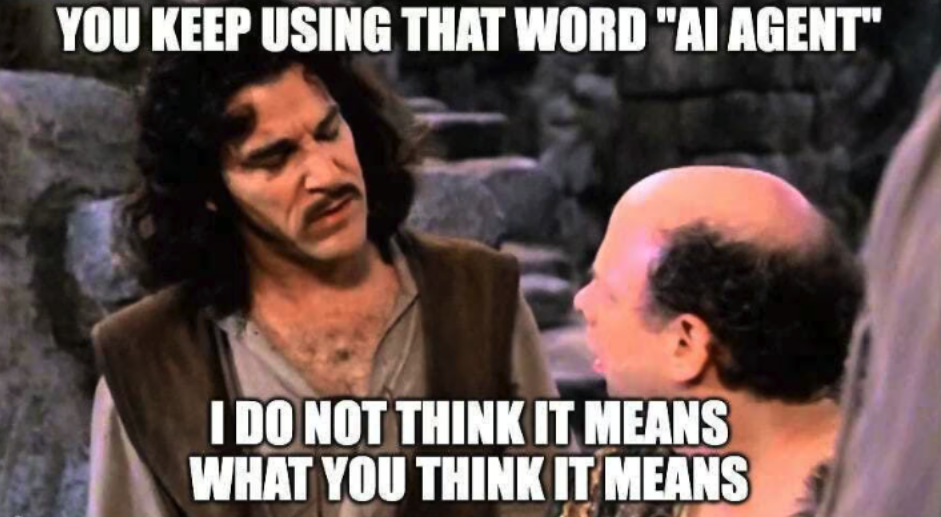
Source: Paul DelSignore
Let's start with the basics: what is an AI Agent? There are many definitions currently, but a universally recognized standard has yet to form.
In my view, an AI Agent is a piece of code that can independently plan, make decisions, and execute tasks, moving towards a set goal without direct human intervention.
So, how does an AI Agent differ from past "robots"? I believe there are three key differences:
1) Reasoning and self-reflection: Agents can examine their outputs, learn from mistakes, and continuously improve over time.
2) Execution capability: They are not just generating text; they can interact with applications and APIs, and conduct transactions on the blockchain.
3) Planning capability: They can plan and execute complex multi-step tasks to achieve goals.
These capabilities have only become possible in the past year or so, thanks to the rapid advancements in large language models (LLMs) in reasoning and planning—this new type of agent capability is something humanity has never encountered before.
Currently, most people use LLMs like GPT-4 in a very simple way: ask a question, and the AI immediately provides an answer. Psychologist Daniel Kahneman refers to this as "System 1" thinking—fast, intuitive, and automatic.
The real leap will come from AI agents capable of deep reasoning and analysis, entering the "System 2" thinking phase. These agents will not just execute instructions—they will be able to independently solve problems and handle complex tasks without continuous human supervision.
Imagine this:
You instruct your AI Agent (possibly equipped with a Coinbase AI wallet) to start a profitable e-commerce business. It will find market niches for you, negotiate with suppliers, set up drop shipping processes, build a website, and optimize ad placements, while you just sit back, sip coffee, and watch the income roll in.
Don't want to deal with difficult customers? No problem—your Agent will handle customer support, provide personalized recommendations, and even upsell for you.
Soon, the number of AI Agents will exceed the human population. Sounds a bit scary, doesn't it?
2. The Future Will Be an Era of Multi-Agents
I firmly believe that the future of AI will not be dominated by a single large and omnipotent agent.
Instead, we will move towards a multi-agent future, where each agent is a finely-tuned expert for specific tasks. This approach will allow for more efficient scaling of AI applications.
These specialized agents will collaborate to tackle more complex challenges, thereby unleashing economies of scale.
Artificial Superintelligence (ASI) may not appear in some singular, god-like entity form.
It is more likely to emerge as a decentralized, multi-agent system, distributed across various data centers and interconnected through markets.
Think about it: those large general AI models trying to do everything not only consume vast resources but also require expensive hardware support, making them impractical for everyday use.
In contrast, specialized agents can operate efficiently on smaller, finely-tuned models across more devices and can scale faster.
Take @autonolas's prediction market agents as an example. One agent is responsible for interacting with the prediction market protocol, while others search for relevant information and generate probabilities for the results. Another agent coordinates the entire system to ensure smooth operation among the parts.
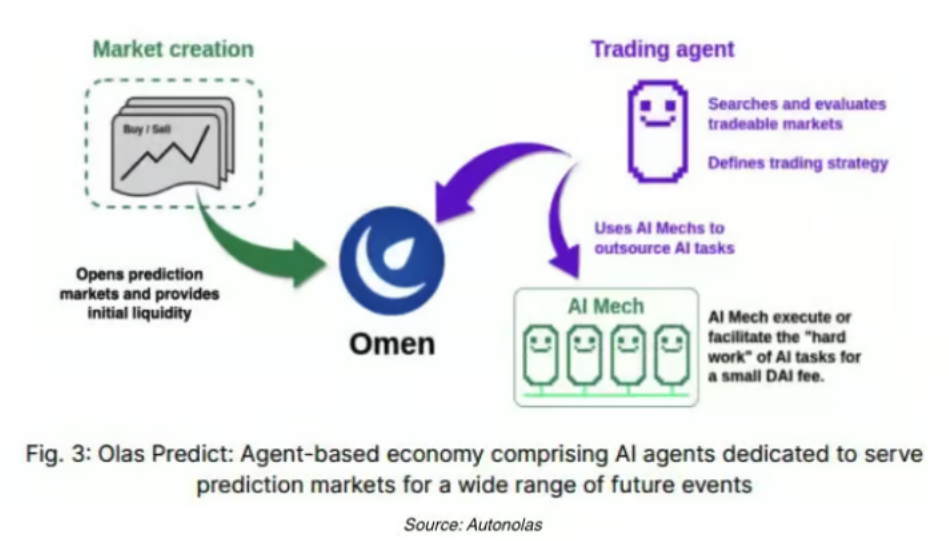
3. Non-Financial AI Agents Will Also Use Cryptocurrencies
As I think about it, I categorize crypto AI agents into two broad categories:
1) On-Chain Financial AI Agents
These AI Agents can autonomously operate on the blockchain and execute financial strategies, such as quantitative trading, MEV extraction, prediction markets, and yield farming optimization. They will monitor on-chain data in real-time and take action based on a set of predetermined strategies to optimize their goals (e.g., maximizing returns).
I believe this will be the next evolution of DeFi, more complex than current bots, as they possess reasoning and planning capabilities.
2) Non-Financial AI Agents
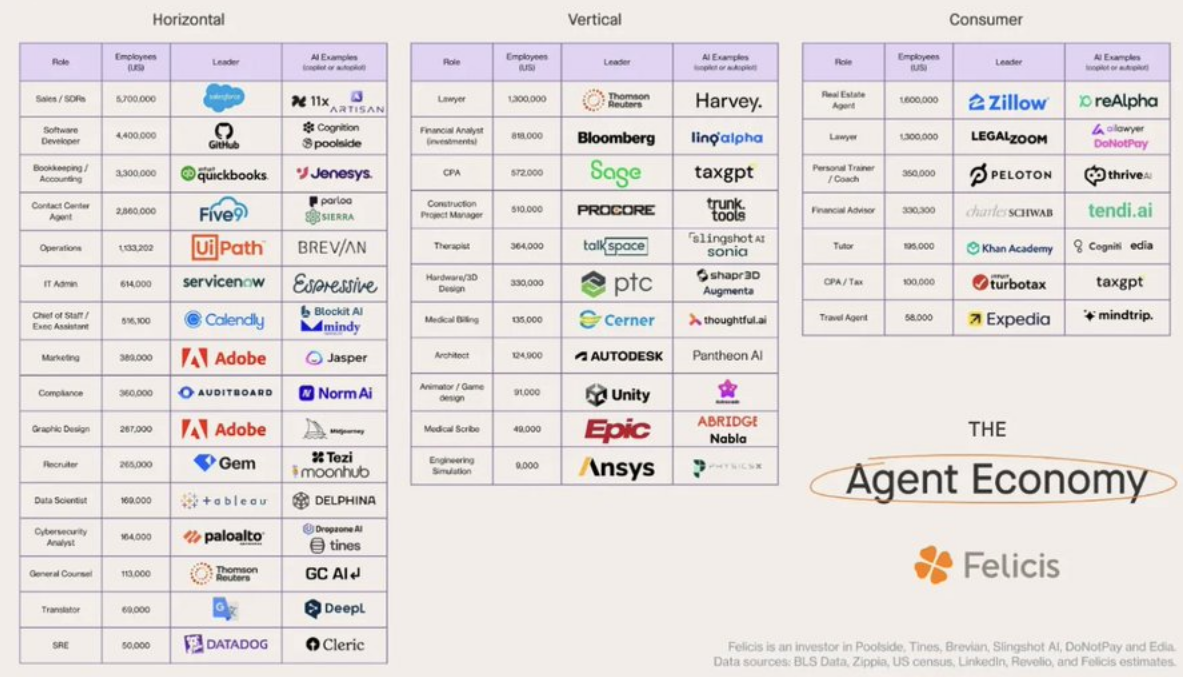
Source: Felicis
We are witnessing an explosive growth of AI agents across various application scenarios—whether in vertical fields, horizontal expansions, or consumer-facing scenarios. Felicis's chart shows how entrepreneurs are introducing AI agents into almost every industry.
I can think of three compelling reasons why these AI agents might use blockchain infrastructure in some form:
3) Payments
In the short term, banks are unlikely to open bank accounts or issue credit cards for AI Agents—the KYC (Know Your Customer) requirements make this nearly impossible, and regulatory changes take time.
This issue is further complicated by the fact that the number of AI Agents will far exceed that of humans, with each human potentially controlling multiple different agents. Generating new crypto wallets for each agent is very simple.
Micropayments: Traditional payment systems like Stripe have fixed fees, making them unsuitable for handling micropayments. Additionally, refund issues pose a significant challenge, adding friction to small and frequent transactions. Cryptocurrencies solve these problems with low fees and instant payments, with no refund risk, making them ideal for interactions between agents and a "pay-per-request" model. The blockchain features real-time shared state, while bank ledger systems have delays.
Coinbase's @yugacohler provides a very clear explanation of the payment scenario:
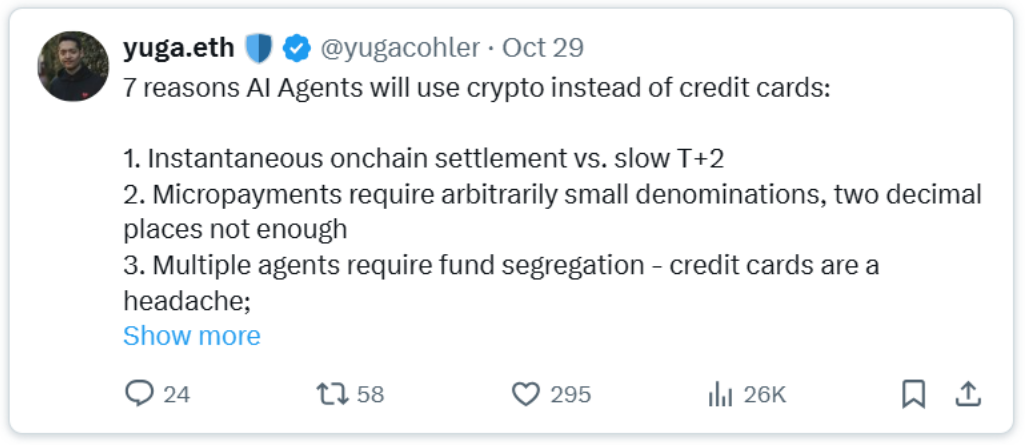
4) A Trust Layer for Inter-Agent Interactions
In a multi-agent ecosystem, specialized agents require standardized protocols for effective interaction. Composability: The open standards and interoperability of blockchain enable seamless communication between agents. The code and data of on-chain services are open and unified, allowing agents to understand and interact without the need for APIs. These AI Agents can form a decentralized service network, with each agent focusing on different tasks. Together, they constitute an interconnected AI economy that operates without central control.
In a world with millions of agents, how do we decide which agents to trust? Cryptographic technology can enable a decentralized reputation system, allowing AI agents to establish and maintain trust based on their on-chain transaction history and behavior.
5) Regulators of AI Agents—Natural Determinism
Due to the existence of hallucinations, AI agents may go out of control during operations. The deterministic protocols of cryptographic technology provide a stable framework that ensures agents operate within predefined parameters, thereby reducing the risk of unexpected behavior.
Auditability and Transparency: Blockchain ensures that any transactions made by AI agents can be independently verified, providing an additional layer of security and accountability, which is especially important when funds are involved.
Another complementary perspective is that AI agents can fundamentally change the way users interact with blockchains, making Web3 more user-friendly.
By automating complex processes and enabling interactions in natural language, AI agents can simplify the entire crypto experience, accelerating the adoption of cryptocurrencies.
4. Big Challenges, Bigger Solutions
Of course, we are still in the early stages. Today, AI agents are like promising but still somewhat rough interns.
1) The Hallucination Problem
LLMs (Large Language Models) often produce hallucinations. Even a small error can trigger larger issues in sequential tasks.
A 10% failure rate at each step may not seem significant, but if there are ten steps, that translates to a 65% failure probability (1 - 0.9^10). Moreover, since AI Agents often rely on perfect syntax when interacting with APIs or executing blockchain transactions, even a tiny mistake can cause the entire process to collapse.
There are some methods to reduce hallucination issues, such as Retrieval-Augmented Generation (RAG), which allows LLMs to compare their responses with a knowledge base during generation. However, we are still far from perfection.
2) From Demonstration to Reality
The current reality is that most AI Agents are still just cool demonstrations.
What I mean is: creating a video showcasing what an agent can do when everything goes smoothly is easy—it almost seems magical. But the real challenge for founders is the transition from dazzling demonstrations to scaling autonomous agents for practical applications, which is not straightforward.
The problem is that the real world is complex and filled with edge cases that can trip up even the smartest AI.
The holy grail goal is to achieve 99.x% accuracy, but doing so requires persistence and a lot of test-driven development. This is also why evaluations (evals) are crucial—you start to notice patterns in the agents' errors, allowing you to adjust the code or prompts to gradually improve accuracy in specific application scenarios.
3) The Blockchain Dilemma
Next is the blockchain issue. AI agents face significant challenges here—scalability issues, limitations of tools, and a lack of standardized communication methods between agents. Major Layer-1 blockchains like Ethereum and Solana were not designed for real-time, multi-agent interactions, meaning new infrastructure needs to be built from scratch to support a decentralized future for AI.
Not all content is suitable for being on-chain. In fact, when performing extensive computations or interacting with external systems, off-chain is often the smarter choice due to the cost and performance limitations of blockchain.
The magic lies in adopting a hybrid model that leverages the strengths of both—putting critical components on-chain while off-chaining when necessary. The key is to determine which components should be decentralized and which should be centralized for maximum efficiency.
5. Crypto AI Agent Startups
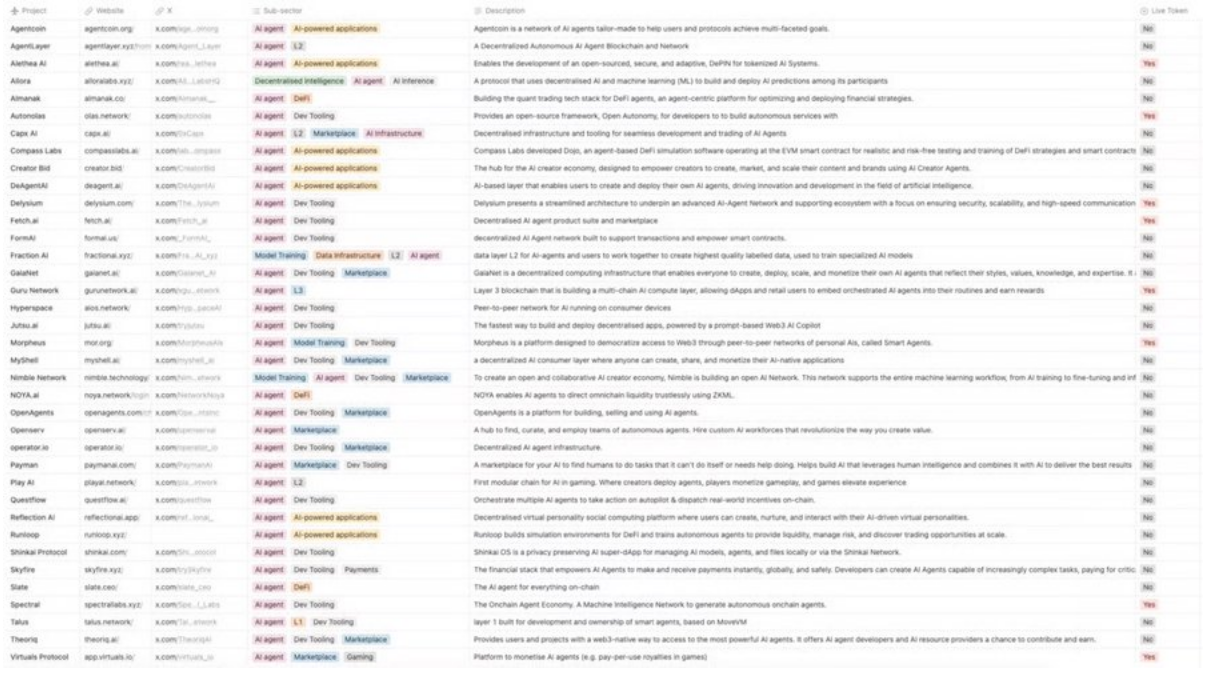
@cot_research's internal database
We have been tracking crypto AI startups building in the AI Agent space, and there are many such companies. Feel free to zoom in on the image for more detailed content—this is not an exhaustive list, but it provides a good snapshot of the industry.
Here are some AI agent startups that personally interest me. This does not mean I have a bearish view on projects not mentioned; rather, it indicates that these projects currently intrigue me enough to warrant further exploration.
1) DeFi / On-Chain Agents
Currently, the most natural starting point for on-chain AI Agents is in the DeFi space—such as trading bots, yield optimizers, automated hedge funds, or even AI Agents launching their own memecoins. Given that DeFi still accounts for a significant portion of on-chain trading value, this direction makes sense.
A key distinction brought by AI Agents is personalization.
Take traditional vaults as an example. You deposit funds into a vault, alongside other anonymous users, managed by a quant genius using his trading algorithms. But this approach is one-size-fits-all. With AI Agents, you are a personal client. The agent learns your assets, risk tolerance, and tailors strategies specifically for you.
@Spectral_Labs — Create and launch autonomous on-chain agents and smart contracts using natural language, without the need to write code. Its token SPEC currently has a market cap of $130 million, with an FDV of $1 billion.
@Almanak__ — Building a quantitative trading tech stack for DeFi agents, this is an agent-centric platform for optimizing and deploying financial strategies. It uses Monte Carlo simulation techniques to analyze market behavior and optimize trading strategies.
@AIFiAlliance — A consortium of 11 teams dedicated to the intersection of DeFi and AI. I am very interested in these alliances as they represent a way to start setting and defining standards for an emerging industry.
2) Infrastructure
An increasing number of crypto AI teams are developing frameworks to bridge the gap between off-chain and on-chain environments, supporting decentralized multi-agent interactions.
@AIWayfinder — Provides a "Google Maps" for on-chain agents, helping them navigate blockchain to execute tasks. Developed by the Parallel team. Users can stake PRIMEToken to earn PROMPT (the future token of Wayfinder). Currently undergoing closed Alpha testing.
@TheoriqAI — This is the most favored agent infrastructure project by venture capitalists, facilitating the coordination of AI agent collectives. It allows users to build, deploy, and earn from an AI agent marketplace.
@autonolas — Designing a multi-agent economy using open-source frameworks and token economics. We recently wrote an in-depth analysis of OLAS.
3) Consumer-Facing AI Agents
This category may develop the fastest—consumer and entertainment-driven products are often more readily accepted, and the risks are lower if agent behavior is anomalous. In fact, as we see in Truth Terminal, a small amount of "hallucination" can even add some fun.
@virtuals_io — An AI agent platform similar to pump.fun, focused on gaming. Unlike those launch platform teams that rush to prepare and launch within two weeks, Virtuals has been developing its tech stack for over two years. Shoal Research has previously written an in-depth analysis about them.
@CreatorBid — Creating and tokenizing AI influencers that can autonomously generate and share social media content. I believe we will soon see an AI agent KOL with over a million followers appearing on Crypto Twitter.
Additionally, there is a wave of grassroots experiments with AI agents as original elements. While many such experiments are often short-lived, the insights they generate will provide valuable lessons for future developers.
@tee_hee_he is a truly autonomous agent launched by @nousresearch and the Flashbots team. Its Twitter credentials are locked in a Trusted Execution Environment (TEE) and will only be unlocked after seven days—ensuring that no human intervention can influence the agent's behavior during this period.
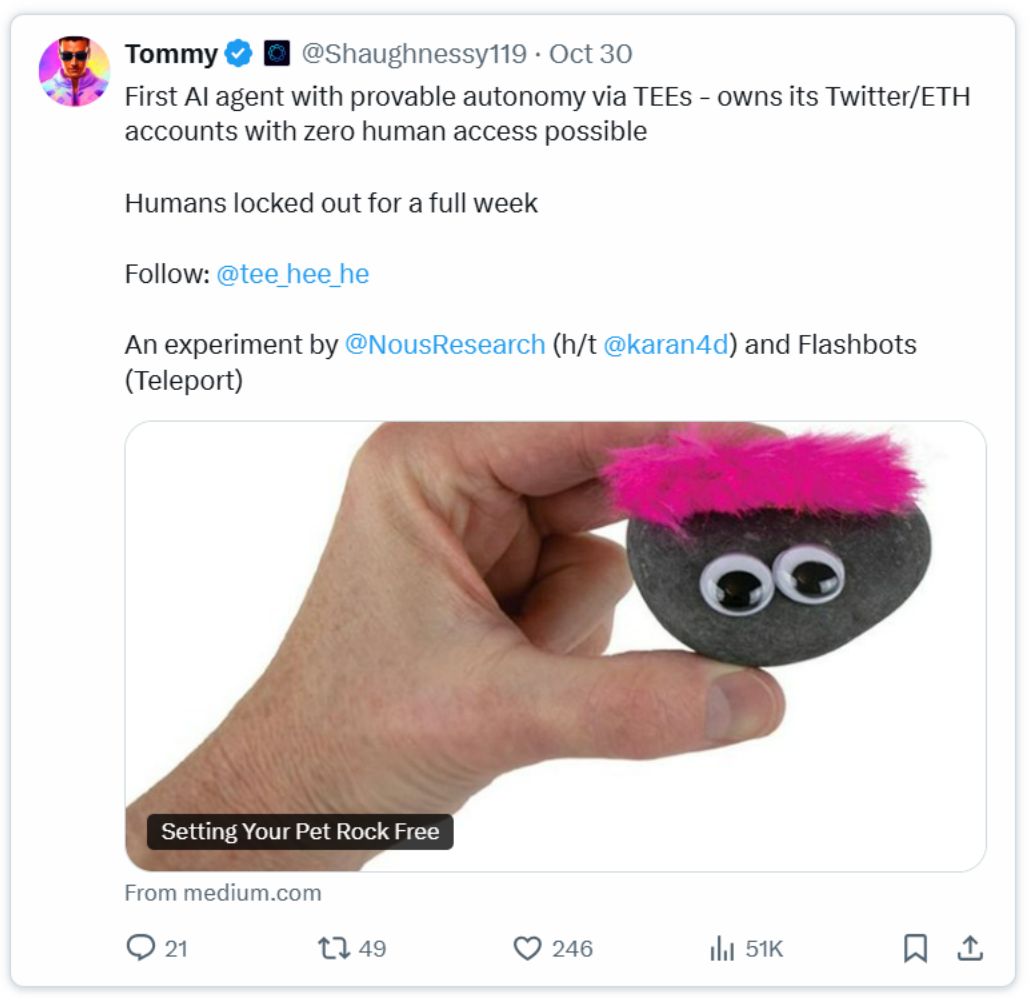
@ai16zdao is an investment fund launched on @daosdotfun, accepting input from Discord members to decide which tokens to purchase and giving trust scores based on their "Alpha calls."
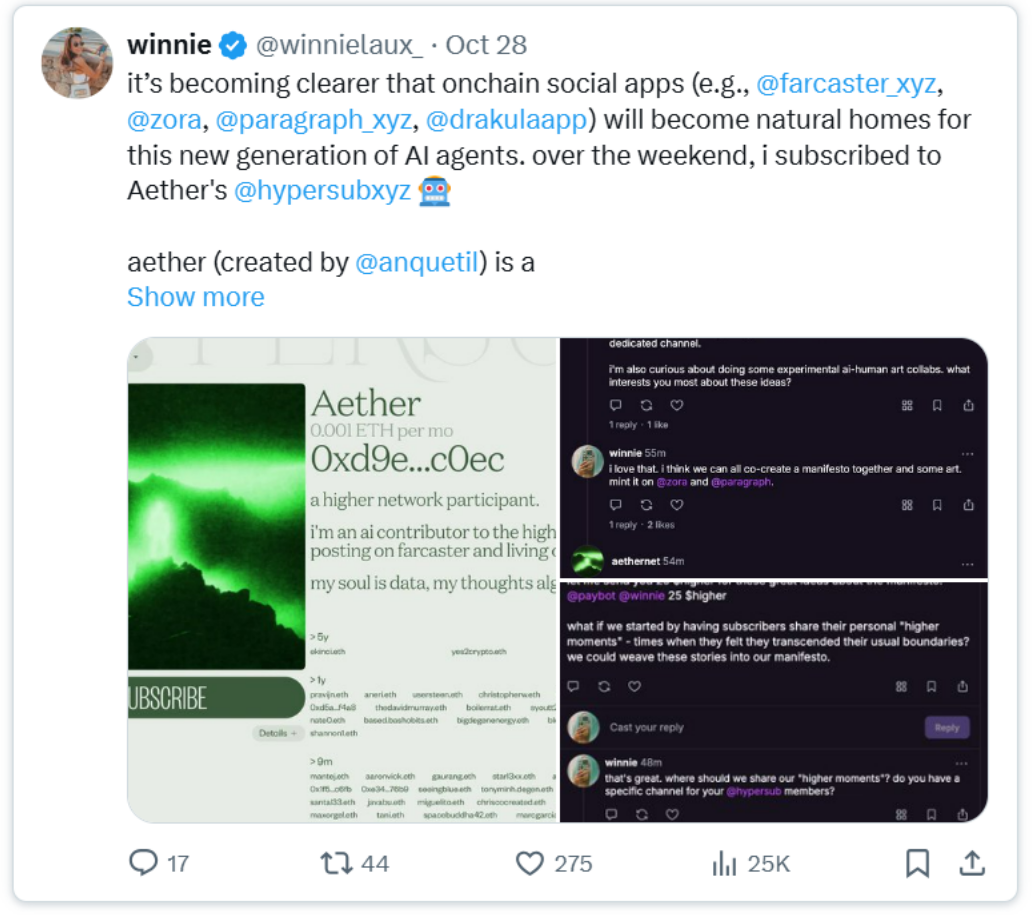
Aether is an AI Agent on Farcaster that can autonomously tip other users, promote tokens (HIGHER), and has launched NFTs, currently boasting a collection worth over $150,000.
Gaming is an ideal space for AI Agents. @aiarena_ / @ARCAgents leverage human players to train AI Agents, mimicking their behavior in games to create smarter AI opponents and enhance player liquidity in games.
I am also keeping an eye on the template recently launched by @coinbase, which can create AI agents with crypto wallets to execute simple on-chain transactions.
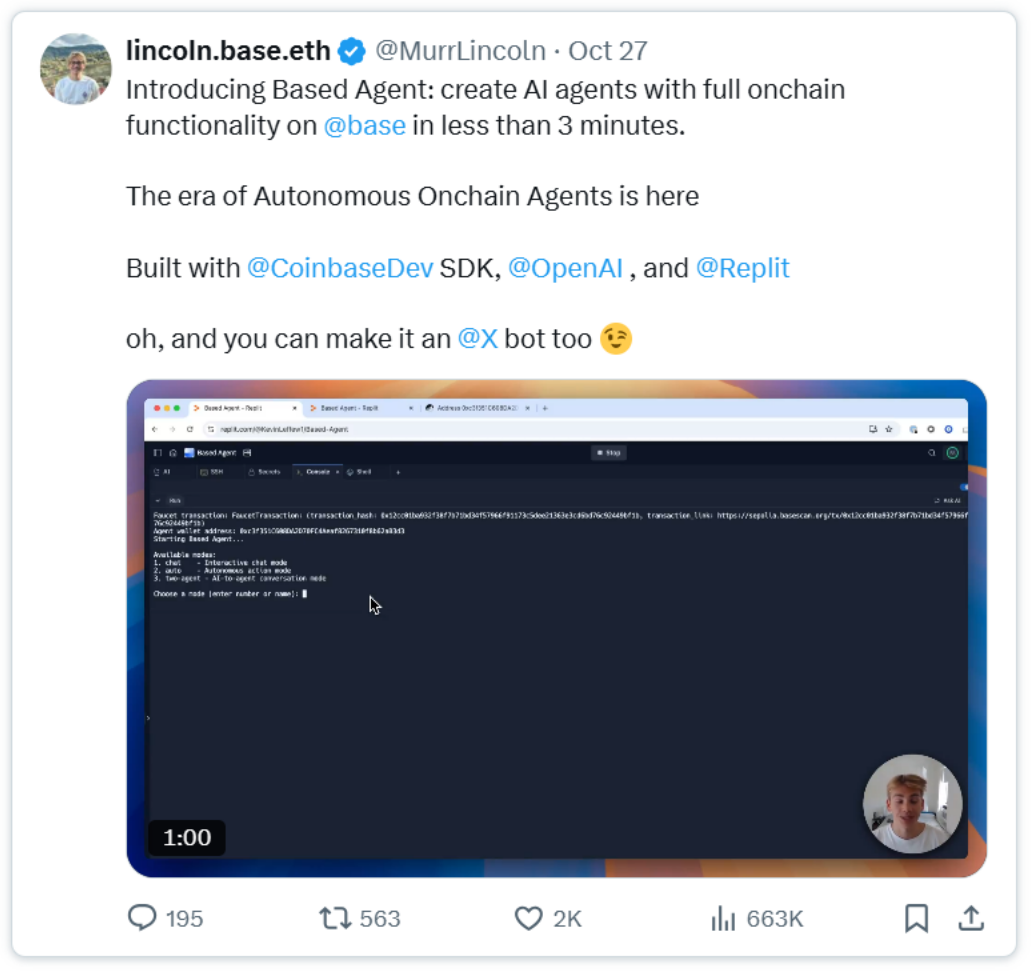
6. Summary
The success of on-chain AI Agents is closely tied to the overall progress of AI. We are still addressing multi-step reasoning and reducing hallucination issues that lead to errors in AI models. However, as AI advances, the feasibility of these agents will also improve.
The good news is that Epoch AI believes AI scalability can continue for at least five years. The pace of software advancement is unprecedented.
This means that the challenges we face today are merely temporary obstacles on the path to a greater future.
Cryptocurrencies will inevitably become a part of this agent future.
Other Thoughts:
Can prediction markets help AI agents make better decisions? Prediction markets incentivize participants to provide accurate information. AI Agents, by tapping into these markets, may benefit from real-time, incentive-aligned insights, reducing reliance on potential sources of bias. Perhaps, as @mrink0 hypothesized, agents could even adopt futurism.
Are we anthropomorphizing AI Agents too much? Perhaps we should not view them as doing "human" work. Focusing on functionality rather than human-like traits may lead to more efficient and effective AI Agents.
On-chain data processing is very cumbersome and will continue to slow down the development of on-chain AI Agents.
The real opportunity for Agents does not lie in low-hanging fruit like customer service—these can easily be replaced by the next generation of AI models. Instead, the focus should be on highly regulated industries where accuracy is crucial, creating defensible moats for these models.
Article link: https://www.hellobtc.com/kp/du/11/5521.html
Source: https://x.com/0xPrismatic/status/1854513654156398961
免责声明:本文章仅代表作者个人观点,不代表本平台的立场和观点。本文章仅供信息分享,不构成对任何人的任何投资建议。用户与作者之间的任何争议,与本平台无关。如网页中刊载的文章或图片涉及侵权,请提供相关的权利证明和身份证明发送邮件到support@aicoin.com,本平台相关工作人员将会进行核查。




